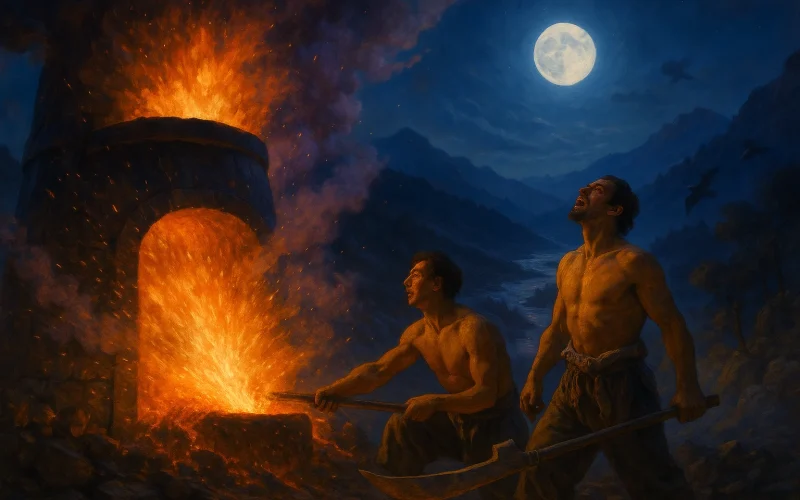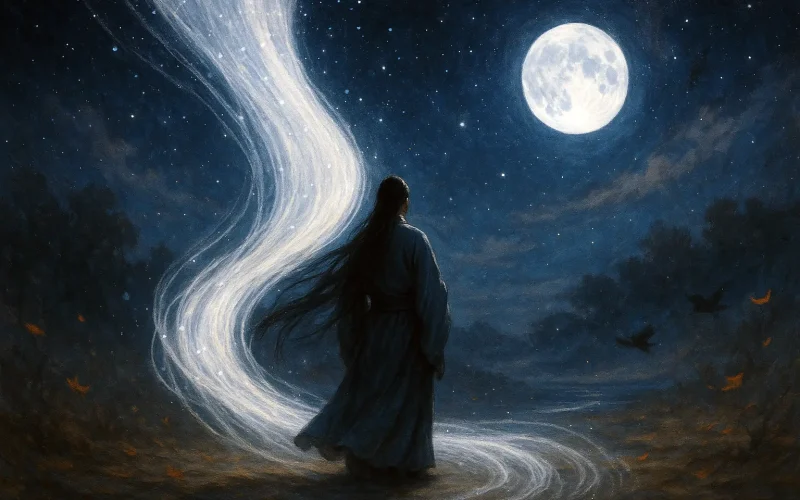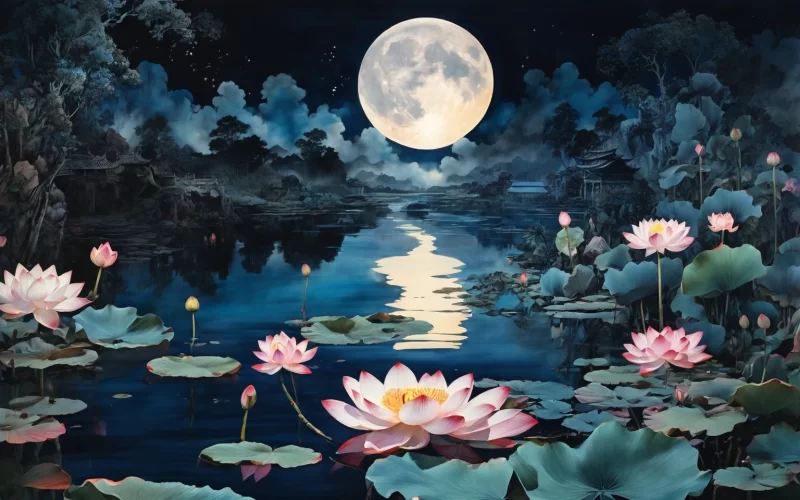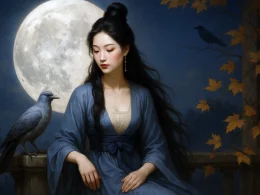The firelight throws a spell on the sky and the land;
The fireball’s red stars mingle with purple smoke.
The flushed lad’s face is lit up by the moon;
His song rises high and moves the cold stream.
Original Poem
「秋浦歌 · 其十四」
李白
炉火照天地,红星乱紫烟。
赧郎明月夜,歌曲动寒川。
Interpretation
This poem is the fourteenth in Li Bai's "Song of Qiupu" series, composed during his later years while traveling in the Qiupu region. As a major copper mining and smelting center in the Tang Dynasty, Qiupu provided Li Bai with a unique subject—he turned his poetic gaze to the smelting labor scene, a topic rarely addressed by previous literati. This work not only depicts a magnificent labor scene but also stands as a masterpiece that positively portrays industrial workers and successfully poeticizes their image in Chinese poetic history.
First Couplet: "炉火照天地,红星乱紫烟。"
Lú huǒ zhào tiāndì, hóng xīng luàn zǐ yān.
Furnace fires light up heaven and earth; Red sparks dance wildly through purple smoke.
The opening employs broad, impressionistic strokes to outline a grand and fiery visual spectacle. "Light up heaven and earth" elevates the labor scene to epic scale, its radiance dispelling night's stillness. The contrast between "red sparks" and "purple smoke" creates intense chromatic tension. The character "wildly" captures both the realistic splattering of sparks and the overflowing vitality and labor enthusiasm, weaving light, color, smoke, and fire into a boiling canvas.
Second Couplet: "赧郎明月夜,歌曲动寒川。"
Nǎn láng míngyuè yè, gēqǔ dòng hán chuān.
Red-faced laborers in the moonlit night; Their stirring songs shake the cold riverbanks.
The poet's focus shifts from magnificent scene to the workers themselves. "Red-faced" is brilliantly used—originally meaning blush from shame, here transformed into a healthy glow from furnace heat, filled with affectionate praise and deep sympathy. "Moonlit night" specifies the time, its cool tones strangely harmonizing with the fiery "furnace." The concluding "songs shake the cold riverbanks" uses hyperbole to transform intangible songs into physical force moving mountains—the ultimate expression of laborer's pride and a poetic symbol of their immense material power.
Holistic Appreciation
The poem's artistic success lies in achieving two great harmonies. First, the harmony between power and poetry: the rugged, intense smelting labor is romanticized through imagery like "bright moon" and "purple smoke." Second, the harmony between humanity and nature: workers' labor (furnace fires, songs) and the natural environment (heaven/earth, moon, cold rivers) complement rather than conflict, jointly composing a robust life hymn. Li Bai transforms ordinary laborers into mythic giants forging the world, endowing them with heroic stature.
Artistic Merits
- Pioneering Subject and Perspective: Making collective industrial labor the poetic focus and granting it sublime aesthetic value was unprecedented in classical Chinese poetry.
- Dynamic Color and Light Application: The entire poem resembles an oil painting with thick colors—"red" sparks, "purple" smoke, and "bright" moon interweave warm and cool tones, creating a unique atmosphere both fiery and serene.
- Multisensory Integration: The first couplet emphasizes vision (furnace fires, sparks); the second introduces sound (songs), forming a three-dimensional artistic space that immerses the reader.
- Perfect Unity of Hyperbole and Realism: "Light up heaven and earth" and "shake the cold riverbanks" are extreme exaggerations, yet their emotional core—labor's passion and power—remains utterly authentic, achieving artistic and lifelike truth.
Insights
This poem radiates humanistic and idealistic light across a millennium, revealing that true beauty and strength reside in the most authentic and passionate labor. Li Bai's writing breaks through the elitist barrier of "mental work surpassing manual work," sincerely praising the dignity and pride of laborers. It reminds us that honoring labor and respecting workers remain essential measures of a civilized society in any era. Today, we should draw from these "river-shaking" songs an optimistic, resilient spirit of building the world with our own hands.
About the poet

Li Bai (李白), 701 - 762 A.D., whose ancestral home was in Gansu, was preceded by Li Guang, a general of the Han Dynasty. Tang poetry is one of the brightest constellations in the history of Chinese literature, and one of the brightest stars is Li Bai.












